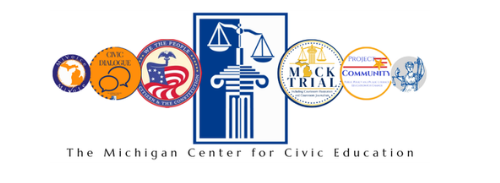Students learn about the Bill of Rights and the Importance of Rights
Civics Lessons
A Visitor from Outer Space
Michigan Court System
The lesson includes a read aloud book to teach students about the Michigan Court System.
The Tired King
Students learn about the three functions of government in this interactive role play.
What Basic Ideas About Government Are included in the Preamble to the Constitution?
This lesson explores some ideas in the Preamble to the Constitution. Students learn that the power to govern belongs to the people who have created the government to protect their rights and promote their welfare.
The Exchange: Should Students’ Cyber Speech Be Protected Under the First Amendment?
This lesson encourages students to deliberate on the issue of cyber speech and the First Amendment. Through the use of court cases and school policy, students will be able to define student expression rights and then evaluate the necessity and constitutionality of censoring and reprimanding students’ online social networking behavior.
Connecting the Separate Powers
In this lesson, students will gain an understanding of the separation of powers using role playing and discussion. Students will identify which parts of the Constitution provide for the branches of our government, and will categorize public officials into one of these three branches.
Moot Court : An Appellate Court Simulation People of the State of Michigan v Booker T. Hudson, Jr.
Students learn about the Michigan Supreme Court, developing oral arguments about an actual case examining Fourth Amendment rights related to search and seizure,
Colonial Influences
American colonists had some strong ideas about what they wanted in a government. These ideas surface in colonial documents, and eventually became a part of the founding documents like the Declaration of Independence and Constitution. But where did they come from? This lesson looks at the Magna Carta, Mayflower Compact, English Bill of Rights, Cato’s Letters and Common Sense.
What Does the Preamble of the U.S. Constitution Mean?
Students compare and contrast the language in preambles to two state constitutions; compare state preambles with the preamble of the U.S. Constitution; draft a new preamble for the U.S. Constitution; and discuss the process of amending the U.S. Constitution
The Exchange: Can Government Prohibit Citizens from Owning Handguns?
This research and deliberation activity encourages students to look at the issue of gun control from different points of view. Then, through deliberation, they will find political measures to address this issue. In any deliberation activity, compromise and listening will play a key role in finding common ground. This lesson is designed to promote an atmosphere of mutual respect for differing points of view on controversial issues.

